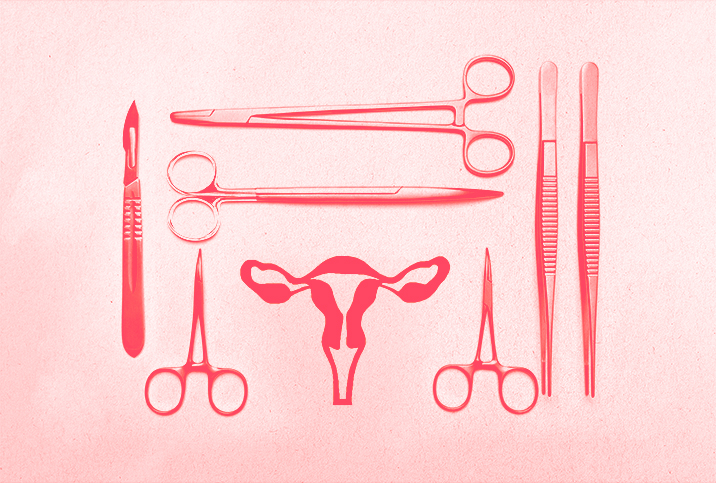Mitigating the Symptoms of Surgical Menopause

There are multiple reasons you might undergo oophorectomy to remove your ovaries. You may be suffering from ovarian cancer, endometriosis or pelvic inflammatory disease (PID), or you may test positive for the BRCA gene mutation and want to minimize the risk of ovarian and breast cancer.
No matter the reason you're undergoing this surgery, you're in for a significant adjustment when your ovaries are removed because they are the principal source of estrogen for your body. This rapid transition to a postmenopausal state is referred to as "surgical menopause."
Symptoms to expect after surgical menopause
Most patients undergoing an oophorectomy are younger than the average age of menopause, which is 51 in the United States. Natural menopause can occur earlier, though it's rare, affecting only 1 percent of women younger than age 45.
However, the symptoms of menopause often begin several years before the actual cessation of your period, during a time called perimenopause or the menopausal transition, as hormone production gradually declines. With surgical menopause, there is no gradual adjustment of hormones.
Your previous "normal" may be replaced by hot flashes, night sweats, insomnia, fatigue, depression and anxiety. Surgical menopause is initiated rapidly via surgery rather than gradually via aging, so the symptoms tend to be more severe. And those are just the short-term effects. The long-term effects of surgical menopause can include decreased sex drive, vaginal dryness, a higher risk of early cognitive decline and loss of bone density, leading to an increased risk of osteoporosis.
"Studies have also shown that if you have surgical menopause prior to the age of 45, there is a marked increased risk of heart disease," said Tara Scott M.D., an OB-GYN and medical director of Integrative Medicine at Summa Health System in Akron, Ohio.
Heart disease is the leading cause of death for women in the United States, according to the Centers for Disease Control and Prevention (CDC).
Preventing surgical menopause symptoms
Experiencing instant menopause can cause some seriously uncomfortable symptoms. Thankfully, some of these symptoms can be managed with lifestyle adjustments.
Osteoporosis
The risk of osteoporosis can be mitigated by weight-bearing exercise, such as walking, hiking, weightlifting, yoga and aerobics. These exercises slow mineral loss and, therefore, slow the loss of bone density. You may also benefit from adding calcium and vitamin D3 supplements to your regimen, but talk to your doctor first and follow their dosage instructions.
Skin changes
Changes to the skin can also be managed with lifestyle changes. The decline in estrogen after an oophorectomy may cause skin to become drier, thinner and prone to sagging and wrinkles, and wounds might heal more slowly. These changes occur to the sensitive skin of your vulva, too.
Using a moisturizer that includes hyaluronic acid and is formulated especially for intimate areas can be useful for mitigating these symptoms. In addition, staying hydrated, eating a healthy, balanced diet and implementing a skincare routine can help improve the condition of your skin.
Mood conditions
The menopausal transition can wreak havoc on mood conditions such as depression and bipolar disorder, said Ann L. Steiner, M.D., an OB-GYN and clinical professor at Penn Medicine in Philadelphia. Irritability and insomnia are both side effects of menopause, and have serious potential to affect your mood.
While some women experience improved psychological well-being postsurgery, women already suffering from depression may experience worse mood conditions after surgical menopause, according to an article published in the Journal of the North American Menopause Society.
If you're suffering from a mood condition after surgical menopause, it's important to talk to your doctor, who may prescribe antidepressants or adjust your current dosage.
Menopausal hormone therapy
For some patients, menopausal hormone therapy (MHT), also known as hormone replacement therapy (HRT), may be an option. MHT may ease the abrupt drop in hormones that occurs when the ovaries are removed, Scott said. This change in hormones is the source of the intense symptoms of surgical menopause. Mitigating the decrease in hormones with MHT may be an effective option for symptom relief.
Estradiol, a form of estrogen, is commonly given as a hormone replacement after a patient goes through surgical menopause. Progesterone is also recommended to help prevent endometrial cancer.
"Estrogen should not be given without progesterone even after hysterectomy," Scott said.
However, MHT is not a cure for everyone experiencing surgical menopause. For people who had their ovaries removed out of precaution due to carrying the BRCA gene mutation, it's a risk-vs.-reward situation.
Estrogen causes cell growth, and there are estradiol receptors in every cell of your body. Even with progesterone prescribed to counter estrogen-related growth, there is still a risk of developing cancer. Depending on the severity of your symptoms and your risk tolerance, it's important to have a conversation with your doctor about the risks and potential rewards of MHT.
Regardless of your situation, Scott recommended finding a hormone therapist who can test your hormone levels and counsel you on the options for managing your postmenopausal symptoms. Look for someone certified by the North American Menopause Society or the American Academy of Anti-Aging Medicine.
Emotional support options
Going through a roller coaster of symptoms from surgical menopause can leave anyone reeling. If you find yourself needing support on either side of this monumental life change, you are not alone. Many support groups can be incredibly useful, as they combine members at all stages in this challenging process.
"I refer all my patients to our support group because only other people who have gone through surgical menopause can truly understand what it's like," Steiner said.
There is also an abundance of support to be found online. Ovacome is an ovarian cancer charity whose goal is to help people who are experiencing surgical menopause. The Surmeno Connection is an online resource and support group that assists people before, during and after surgical menopause. It offers peer-to-peer counseling from members who are farther along in their surgical menopause journey. The Ovarian Cancer Research Alliance also offers peer-to-peer support and a wealth of resources, including the latest research on the disease.
If you have had surgical menopause and are struggling with the symptoms, know that you are not alone. Talk to your doctor about ways to minimize your symptoms and reach out to an online or local support group to help guide you through this time.


















